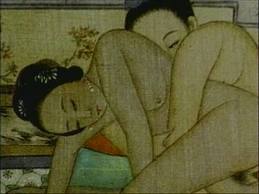
Above: Scanned excerpt from ‘Interlok’, page 158
RELATED: Interlok: Chinese sell their daughters
The main character in the book is Cing Huat who arrives in this land with his father Kim Lock. One of Kim Lock’s first jobs was to pull a rickshaw, whereas his son — the young boy — slaved away as a kopitiam assistant.
Kim Lock also worked as a nightsoil carrier, i.e. someone who daily collects and empties the buckets of human faeces from outhouses in the neighbourhood. In those old days, they did not have indoor plumbing with the flush system.
Page 124: The Chinese immigrants set sail from their village in China because they were impoverished.
Dua minggu sesudah itu, pagi-pagi lagi bertolaklah rombongan kecil itu meninggalkan desa nenek moyang mereka untuk mencari daerah baru. Mereka telah mengambil tekad, daripada hidup menderita di tanah air sendiri, lebih baiklah mati di negeri orang.
Page 134: They came here to this land of milk and honey with nothing except the shirt on their back.
Mereka yang membawa bekalan baju menggantinya dengan yang kering, kalaupun baju bekalannya itu terselamat daripada air, tetapi kebanyakan mereka tidak punya baju lain selain daripada yang lekat di badannya. Angin pagi itu menambahkan kesejukan lagi, tetapi mereka menahannya juga dengan sabar. Nun, di sana — ada sebuah negeri yang sedang menunggu mereka. Negeri yang kaya dengan hasil mahsul.
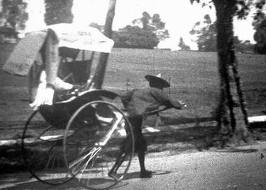 The portrayal of early Chinese immigrants as hardworking manual labour is not necessarily negative. However reinforcing the nasty stereotype of Chinese as grubbers willing to steal and do anything for money is bigotry.
The portrayal of early Chinese immigrants as hardworking manual labour is not necessarily negative. However reinforcing the nasty stereotype of Chinese as grubbers willing to steal and do anything for money is bigotry.
Page 119:
Kita minta sedekah. Kita curi. Kita tak punya anak perempuan. Kalau ada anak perempuan kita boleh jual.”
See our previous posting, Interlok: Chinese sell their daughters.
The author Abdullah Hussain portrays the Chinese as caring for little else except to make money — lots of it — and to get rich quickly, e.g. in the words that he puts into the mouth of a Chinese boatman talking about the philosophy of the Chinese sin khek in Singapore around the turn of the century circa 1900s (the period in which the story is set):
“Soal suit tak ada musuh, musuh ialah orang-orang yang mahu menghalang kita cari makan.” (Page 141)
“Gua tak dapat menggali tanah, kerana tanah orang punya. Gua tak dapat memanjat pokok, kerana pokok orang punya. Tetapi dari hujung dayung ini gua boleh tolak duit, tengok!”
The Chinese are portrayed as mercenaries having absolutely no moral scruples.
When Kim Lock is made drunk by Paman Kok Leng (the recruiter who is the middleman bringing Chinese villagers here), Kim Lock’s hard-earned money is stolen from his pocket by Kok Leng, the one-dimensional villain of the piece. Apart from being a pickpocket, Kok Leng is an out-and-out rapacious cheat who takes advantage of the ignorant Chinese country bumpkins.
.
.
‘Money is God’
Page 156 (left): “In a big and alien city like this [Singapore] a person cannot have sympathy for others. If we are soft-hearted, we cannot become rich. Here money is the yardstick. In this world, money is the second God.”
The community is depicted as eternal migrants impelled from place to place and always seeking greener pastures. — Page 160: “Aku mahu cari wang, aku mahu pergi ke tanah besar (i.e. the peninsula).
Page 177:
Dia hanya fikirkan bagaimana dia dapat mencari wang dan menjadi kaya lekas.
Page 198:
… dia sudah mulai sedar bahawa di Rantau Selatan ini, bukan semangat nenek moyang yang dapat menolong, melainkan wang ringgit.
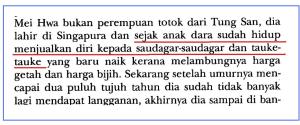 Kim Lock’s mistress Mei Hua has been selling her body since young. – the Chinese characters are indeed portrayed in the most unedifying terms by Abdullah Hussain.
Kim Lock’s mistress Mei Hua has been selling her body since young. – the Chinese characters are indeed portrayed in the most unedifying terms by Abdullah Hussain.
When Mei Hwa hangs herself in the jamban/outhouse shortly after the passing of Kim Lock (whose premature death was due to opium addiction), Cing Huat is too cheap to buy the ex-hooker a coffin and so allows the police cart away her corpse to town to be buried in the pauper’s grave.
Excerpt above, Page 227: Yew Hock — Chin Huat’s eldest son — is pictured as a “kedekut” (stingy) trader always looking for profit and someone who demands a good bargain but when he in turn buys from others, he only offers the lowest prices.
Page 231:
Kekayaan mesti ditambah, seperti dia menambah kekayaan yang ditinggalkan oleh bapanya dahulu.
Page 232:
… Huan na (Malays). Malas, tak tahu cari duit. Gua tak mau lu jadi macam mereka (Cing Huat scolds his second son Yew Seng who is “amat malas, sedikit pun dia tidak mahu ambil tahu tentang soal mencari wang”. )
The BTN subtext to indoctrinate
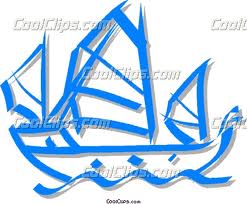 .
.
What are the impressions to be drawn from Abdullah’s storytelling above?
That the Chinese are a nasty, cheating race whom anyone decent would shudder to have as his neighbour.
The Chinese characters are most unsympathetic and scarcely have any redeeming graces. They have no loyalty to the country (we’ll cover the ‘unpatriotic’ aspect another time).
This book is a less-than-subtle vehicle to knock into the heads of young students (who have to study this novel for their exam) that the Chinese pendatang — referred to repeatedly in the book as “bangsa asing” — must be grateful for the opportunities given by Malaya. It parallels the ‘pariah’ theme with regard to the Indian characters.
To understand how “pendatangs must be grateful” because they came here as opportunistic pariahs, view the ex-Perlis Mufti Dr Asri in the YouTube below.
From minute 3:57 onwards
“Sangat hina kehidupan mereka di dalam negeri mereka. Kasta pariah ini telah dibawa oleh Inggeris ke dalam negara kita … kehidupan yang mereka nikmati di sini seribu kali ganda lebih baik daripada … negara merempat, naik bas, tak pakai baju, tak pakai seluar.”




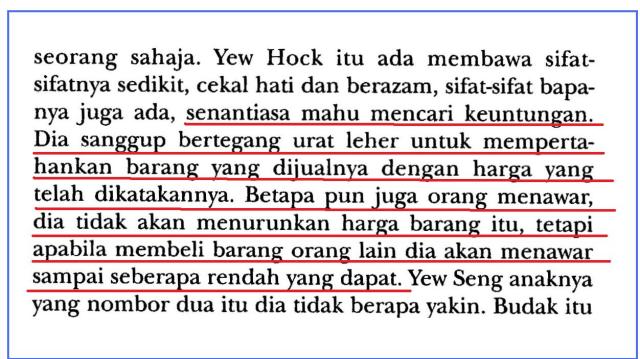
No comments:
Post a Comment
Note: Only a member of this blog may post a comment.